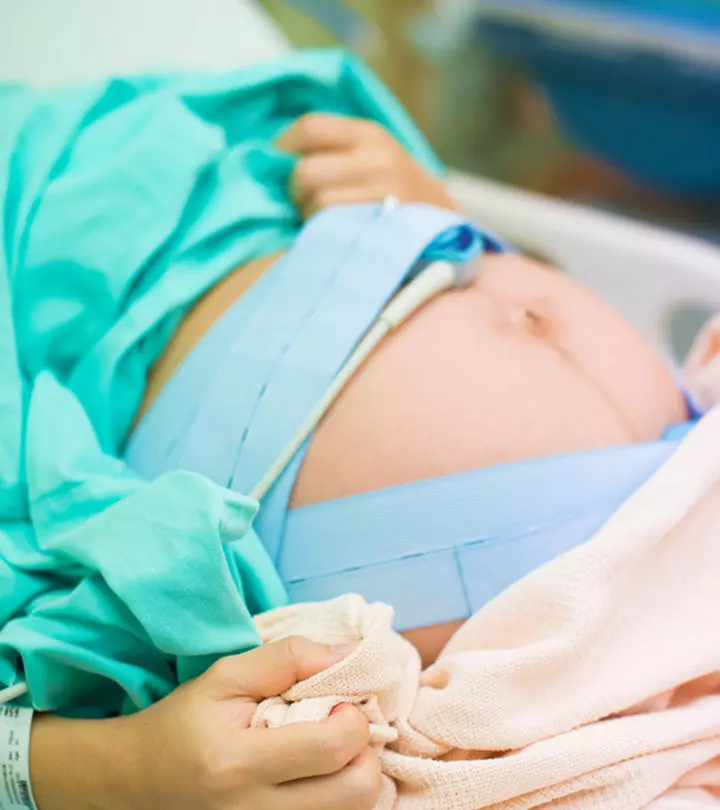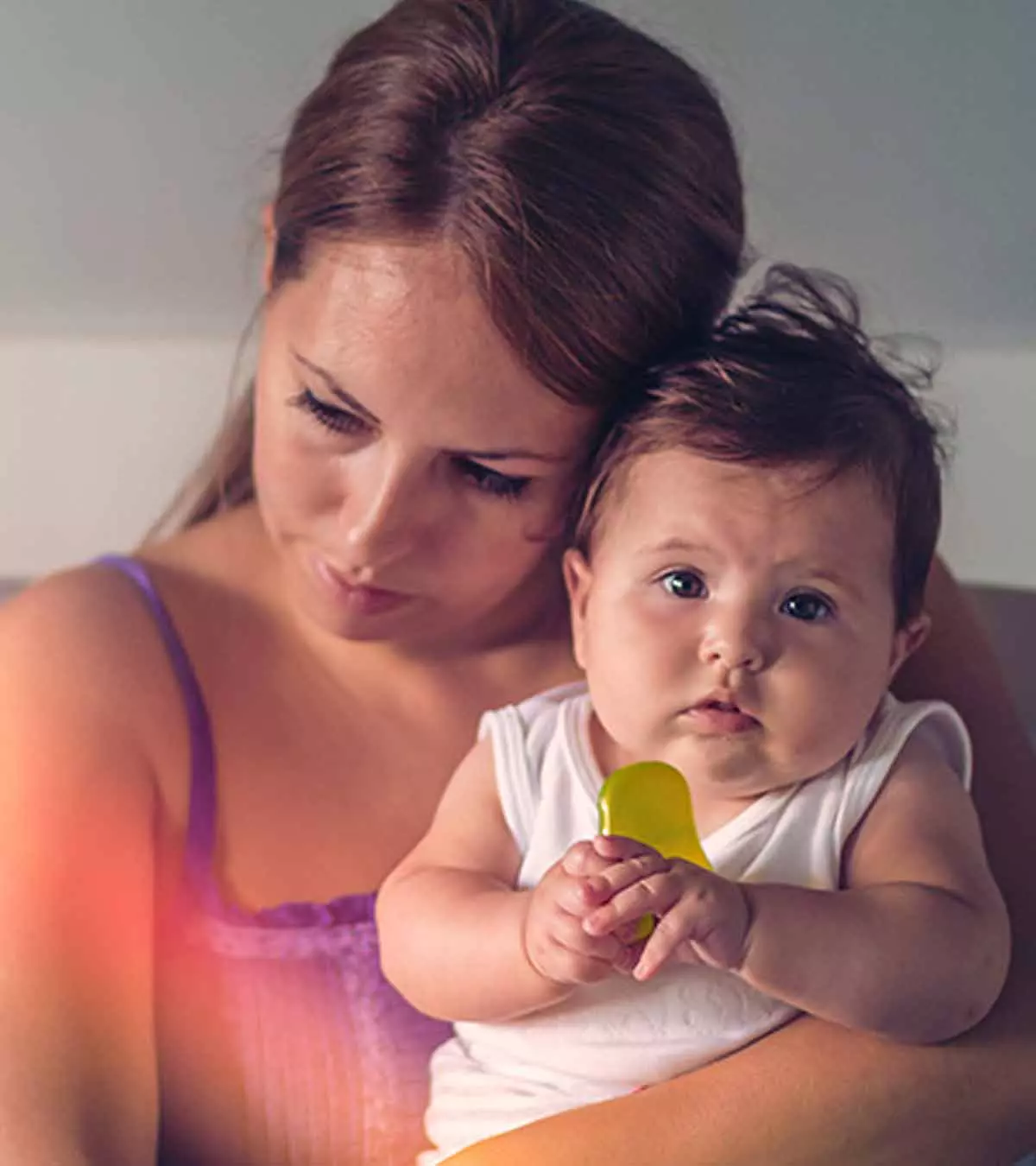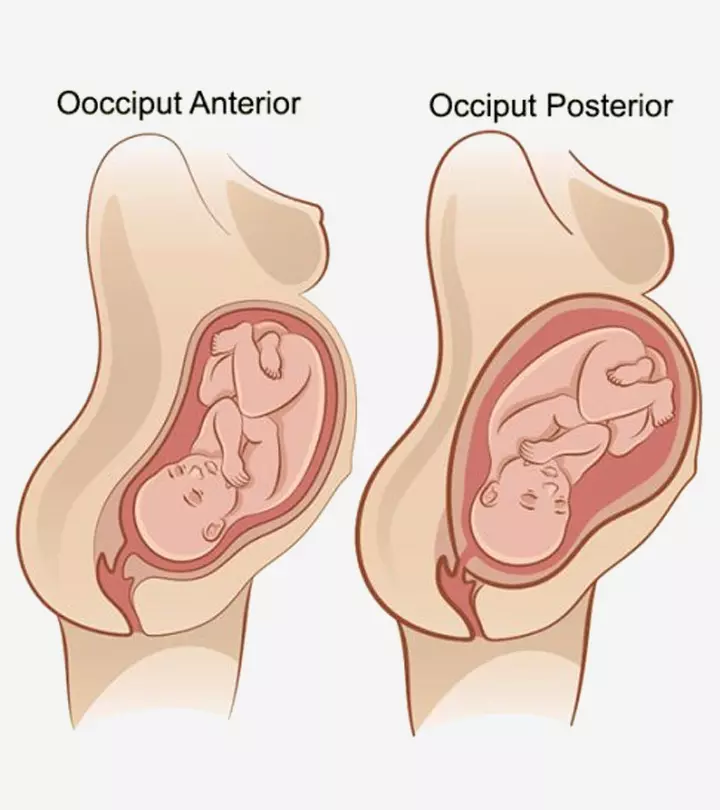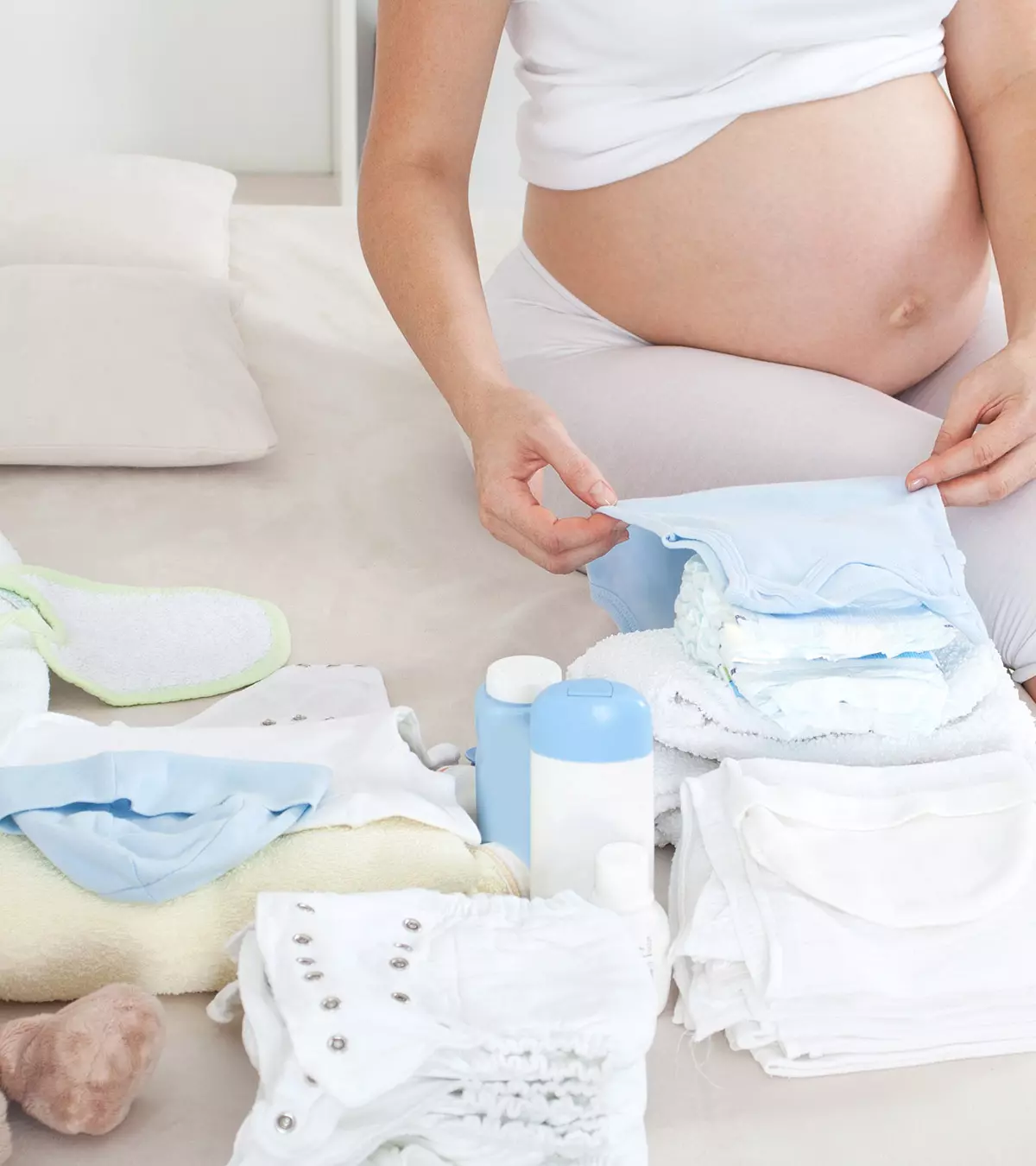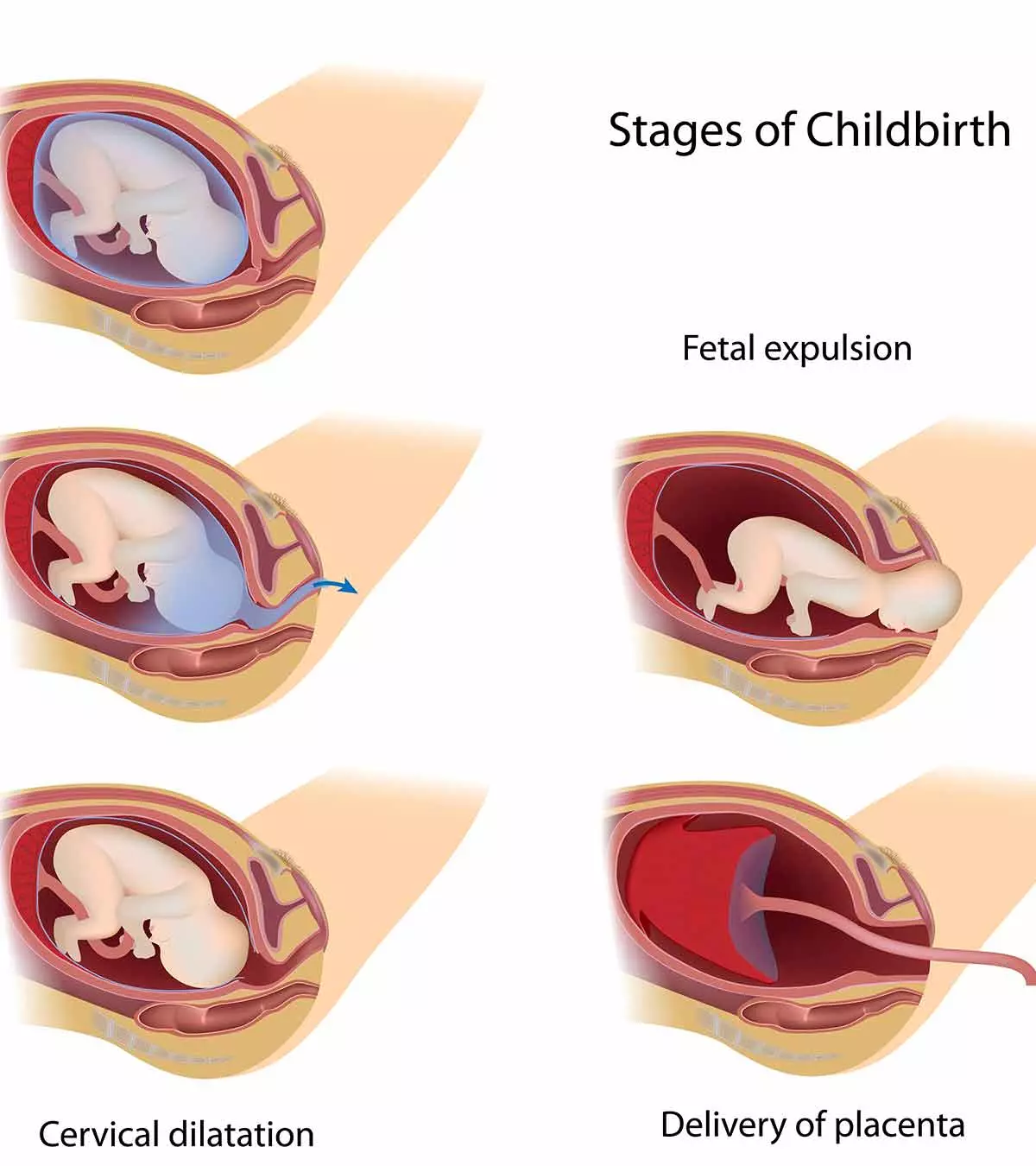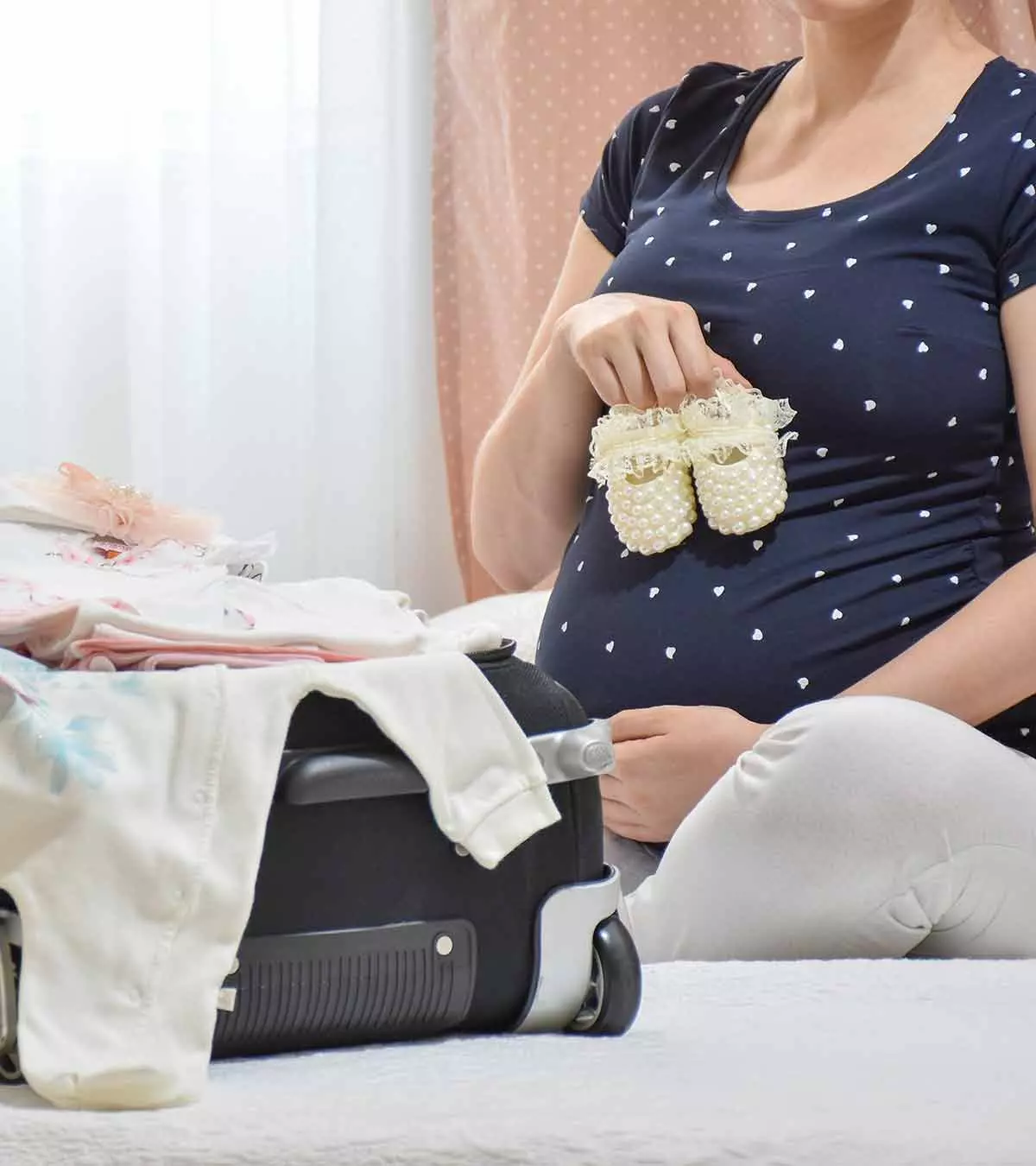
Image: ShutterStock
When you’re at the end of your third trimester or even a week into your ninth month, you should be extra cautious and ready to welcome your baby into the world at any moment. However, you may be curious about when to start packing your maternity hospital bag.
When you’re nine months pregnant, your water may break at any time, and you may go into labor. Therefore, you must be prepared to go to the hospital. While packing a hospital bag may appear a minor task, you will appreciate the value of one when you need it. Therefore, don’t put it off until the last minute.
If you’re unsure of what to pack, read this post as we tell you the necessities and goods you should include in your bag for yourself, your spouse, and your newborn.
Key Pointers
- Begin packing your maternity hospital bag when you reach 36 weeks of pregnancy, as labor can occur at any time from the 37th week.
- Organize important documents such as investigation reports, ID proof, insurance cards, birth plans, and hospital forms neatly in a case file.
- Pack loose and comfortable maternity clothes, old slip-on shoes, socks, undergarments, extra maternity pads, nursing bras, toiletries, eyewear, and cellphone.
- Make sure to include a list of prescription medications and bring all your regular medicines.
When To Pack A Hospital Bag?
The best time to start packing your hospital bag for delivery is around the 36th week of pregnancy, as labor can begin anytime from the 37th week onward.
However, if the doctor suspects an early delivery due to various reasons, then you can pack the things much earlier.
Pack your bag in advance so that you do not miss anything.
A blogger and mom who goes by the name ‘The Indian Gastronaut’ experienced a last-minute rush. She recounts, “It was Saturday morning when I went for my routine check-up. Looking into my reports, my doctor told me that she needed to do a C-section immediately. I was worried as mentally I was not prepared. I called my husband, and he encouraged me and calmed me. I was not ready with my hospital bag. Many of my friends who are already moms suggested to me and guided me on what to take along with me in my hospital bag. However, in a hurry, there were a few things I missed and even though someone guides you, many of your requirements that you need you may realize later when you are in that situation (i).”
What To Carry For Yourself?
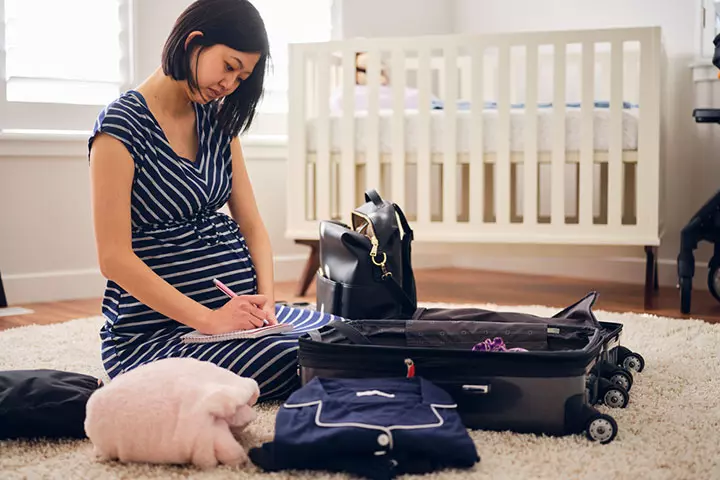
Image: IStock
If you have a vaginal delivery, then you might need to stay for around two to three days in the hospital. However, if you undergo a C-section, then you have to stay for three to four days.
Here are the things you must carry in your delivery bag:
- Documents: Neatly secure case files with all investigation reports, your ID proof, insurance card, birth plans and hospital forms, and keep them handy and make a checklist, if required.
- Dresses: Pack loose, comfortable maternity clothes to wear in the hospital. While going to the hospital, wear an old, loose-fitting dress. Do not buy new ones for this because the dress would get stained with blood and fluids during labor. Also, get dresses with front buttons to unbutton them easily for breastfeeding the baby after delivery.
- Footwear: Pack slip-ons as they are comfortable to wear during the hospital stay. Take a pair of socks too, to keep your feet warm for comfort.
- Lip balm: During labor, the warm condition inside the labor room can make your lips dry out. Post delivery, you may use the lip balm to moisten your lips.
- Massage oil: It is good to carry a massage lotion or oil, which your partner may use to massage your back and legs during contraction pains.
- Snacks and drinks: Keep candies or lozenges handy. This will help prevent your mouth from drying out. Isotonic drinks, too, can keep you going during the labor. This preparation might assist you in remaining as comfortable as possible throughout the process.
- Birth ball: It is a great birth tool to support labor. Carry one with you along with the pump so that your partner can inflate it.
- Pillows: Extra pillows make you feel comfortable while relaxing between contractions. Carry a breastfeeding pillow as well.
- Undergarments and sanitary pads: Pack extra pairs of undergarments and packs of sanitary pads, as you would need them in plenty during your stay in the hospital.
 Quick tip
Quick tip- Nursing aids: Carry nursing bras and pads that make breastfeeding comfortable for you. The nursing bras have an opening in the front of each breast, while the pads prevent the breast milk from leaking.
- Accessories: These are items such as hair clips, hair bands, bath towels, and moisturizers that you need every day. Add eye masks and earplugs to the list as they help you sleep while waiting for your delivery.

Image: IStock
- Toiletries: Keep toothbrush, toothpaste, and soap in your bag. Place all these items in a box that is easily accessible.
- Glasses and lenses: If you have glasses or lenses, then do leave a spare pair in the bag, as you might miss those at the last minute.
- Gadgets: Keep your mobile and charger in the bag. You can also take your tablet and portable MP3 player.
- Books: If you like reading books, keep an interesting one in the bag. Reading the book can help you divert yourself from the pain and create a sense of anticipation and excitement during the delivery.
 Quick tip
Quick tipThe one person who will surely accompany you to the hospital is your partner. Therefore, he, too, needs to keep his bags ready.
What Should Your Partner Pack?

Image: IStock
Your partner also needs to carry the essentials items that he will require during his stay in the hospital. Here is the list of things that he may need:
- Clothes: He may pack some casual wears, in which he is comfortable to stay in the hospital.
- Footwear: As he will be making many rounds in the hospital, it is good to pack footwear that can be easily worn and removed.
- Gadgets: The mobile phone and charger are a must-have as he will need to contact several people. It is important to carry a charger too to avoid any timing issues. Also, a camera recorder will be useful if you are interested in shooting the delivery in the birthing room, or take your newborns pictures.
- Accessories: He would need his shaving kit, sprays, et al. Also, ask him to pack a hand-held fan or water spray to keep you cool and refreshed while in labor.
- Snacks and drinks: He wouldn’t get much time to take a break to eat something. Let him pack some snacks and drinks to keep himself from hunger and dehydration.
 Quick tip
Quick tipSo, you have packed your bag and your partner has done his. But are you forgetting somebody?
What To Pack For Your baby?

Image: Shutterstock
The VIP is arriving and they need to be taken care of well. Here is the list of items you need to pack for your baby:
- Vests and bodysuits.
- A packet of diapers; your baby will need them from the time they arrive.
- Baby blanket to keep your little one warm.
- Muslin cloths to wipe your baby when he/she possets. Possetting is normal in all babies as it is a way of bringing out the undigested milk through the mouth.
- Baby car seat if you are planning to leave the hospital with family in a car.
Frequently Asked Questions
1. What not to pack in my hospital maternity bag?
Avoid packing expensive items such as jewelry, too many clothes for you and the baby, and noisy gadgets such as video games.
2. How many baby outfits to pack in a hospital bag?
You may need six thoroughly washed bibs, baby grows (sleep suits), baby vests, and one cardigan and a hat (3).
3. Do I need to pack different items for a vaginal birth versus a cesarean section birth?
There is not a vast difference between things to pack for a vaginal birth versus a cesarean section. However, there are some specific things to pack in a hospital bag for a C-section. Since the stay in the hospital can be longer after a cesarean birth, you should consider the extra days and pack extra toiletries and clothes. You may also pack high-waisted underwear and pants to avoid putting pressure on the incision area. In addition, consider bringing extra cushions or pillows for support.
4. How many bags should I bring to the hospital when giving birth?
It is advised not to burden yourself with unnecessary things when going to the hospital. Ideally, you should carry one bag with all your documents and supplies; if necessary, you may opt for another bag for your papers, but the less clutter, the better.
5. Do hospitals give you baby clothes?
Hospitals often provide basic baby clothing for newborns. These clothes typically include essential items, such as a onesie, a hat, and socks.
However, the availability of baby clothes can vary between hospitals. Therefore, parents should check with the hospital or birthing center beforehand to understand what they provide and if there are any specific recommendations regarding newborn clothing.
The ninth month is the most crucial time of your pregnancy, as you can expect your baby to come into this world at any moment. Therefore, it is important to keep your hospital bag ready. It is advised to keep your hospital bag ready by 36 weeks and place all the essentials so that there is one less thing to worry about while going to the hospital. Remember to pack your clothes, footwear, undergarments, and pillows, as these are the first things you will need after delivery. Your partner should also pack essentials such as documents, the baby car seat, and blankets for the baby when it is time to bring your little bundle of joy home.
Infographic: What Should You Carry In Your Maternity Bag?
When you complete your 36 weeks of pregnancy, it is ideal to start packing your maternity bag to avoid any last-minute rush. Preparing in advance ensures you have all the essentials for you and your baby. The infographic below includes essentials you must pack in your maternity bag for the hospital.

Illustration: Momjunction Design Team
Illustration: Maternity Hospital Bag: What To Pack For The Baby And Yourself
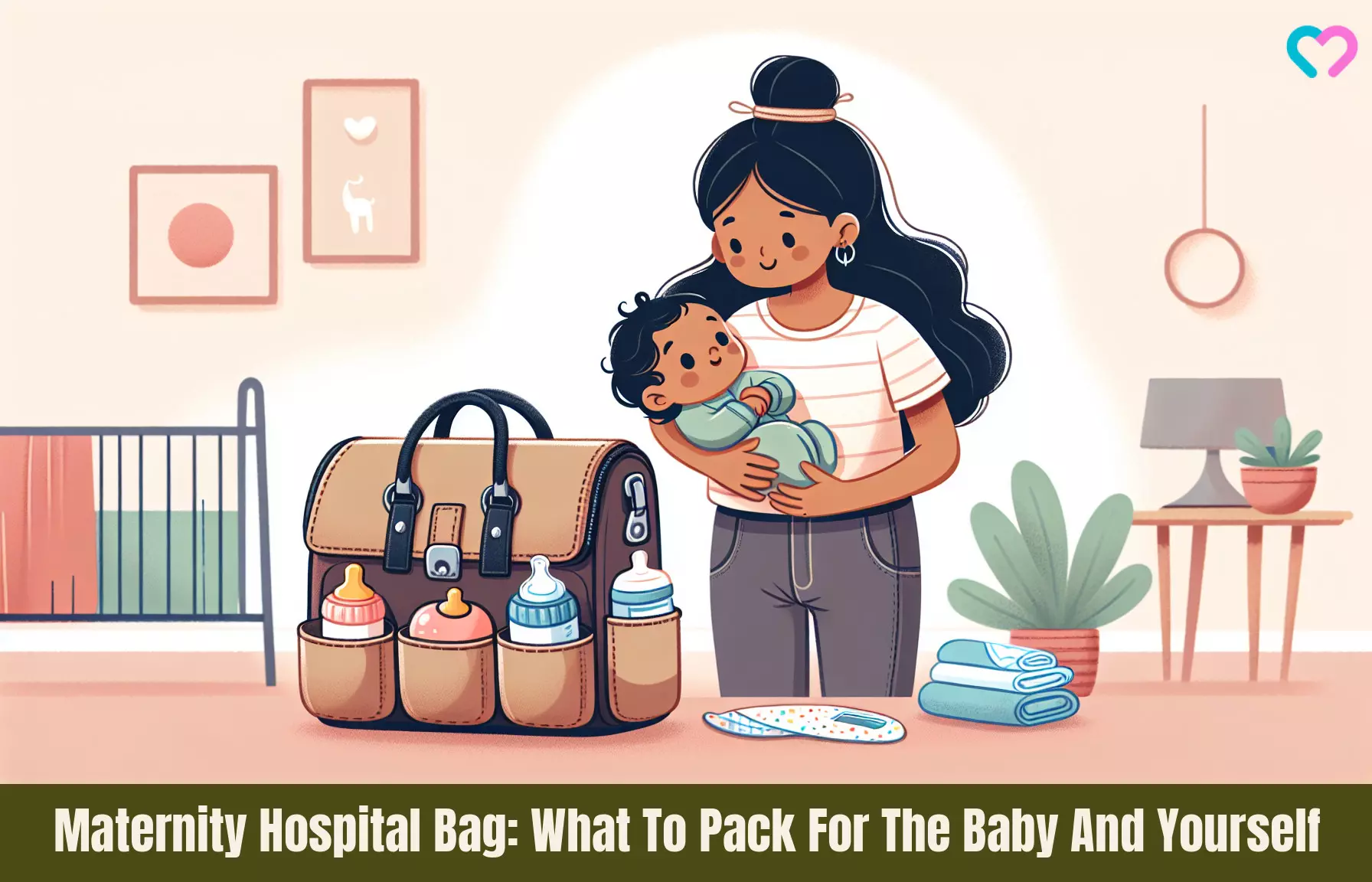
Image: Dall·E/MomJunction Design Team
You can carry only limited things with you to the hospital. Ensure you take all the necessary stuff. Learn from an OB-GYN doctor what to pack in your hospital bag and things to leave out.
Personal Experience: Source
MomJunction articles include first-hand experiences to provide you with better insights through real-life narratives. Here are the sources of personal accounts referenced in this article.
i. Hospital bag checklist before delivery – My personal experience.https://satzworldlylifestyle.wordpress.com/2018/03/29/hospital-bag-checklist-before-delivery-my-personal-experience/
References
- Bleeding after birth: 10 things you need to know.
https://www.nct.org.uk/information/labour-birth/recovery-birth/bleeding-after-birth-and-postpartum-haemorrhage-pph - What to Pack in Your Maternity Bag During COVID.
https://blog.ochsner.org/articles/what-to-pack-in-your-maternity-bag-during-coronavirus - Hospital bag for labor and birth;
https://www2.hse.ie/pregnancy-birth/labour/preparing/hospital-bag/
Community Experiences
Join the conversation and become a part of our nurturing community! Share your stories, experiences, and insights to connect with fellow parents.
Read full bio of Dr. Shashwat Jani
Read full bio of Sakshi Mishra
Read full bio of Rebecca Malachi
Read full bio of Aneesha Amonz















